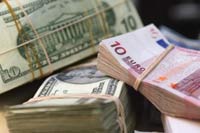Dollar falls vs yen in Asian trading amid uncertainty over U.S. housing market
The dollar fell against the yen Wednesday in Asia, as growing uncertainty over the U.S. housing market and Japan's currency policy prompted bank traders to scale back bets that the yen would decline.

The U.S. dollar was trading at 122.70 yen midafternoon, down from 123.26 yen late Tuesday in New York. The euro fell to US$1.3438 from US$1.3470.
The dollar moved lower against the Japanese currency by nearly half a yen during the session to 122.80 yen. That's the lowest since 122.55 yen on June 14.
U.S. investment banks and Japanese commercial banks sold the euro and the Australian and New Zealand dollars for the yen in what appears to be a reduction of their yen-carry trade positions, traders said. Unwinding of those trades - which essentially are bets that the yen will stay weak - boosted the Japanese unit broadly because investors had to buy it to close those positions.
Market participants stayed focused on the same topics as Tuesday given a lack of fresh trading material in Asia.
"Some players reduced yen-carry trade positions, seemingly due to the cloudy state of the U.S. subprime mortgage market," said Motonari Ogawa, vice president of foreign exchange at Morgan Stanley.
The lingering impact of Japanese Finance Minister Koji Omi's comments Tuesday signaling discomfort with yen-carry trades also fueled yen-buying, traders said.
Global investors feel uneasy because they aren't sure how severe U.S. housing-market problems are, how serious Japan is about supporting its currency, and whether increasing volatility in U.S. stock prices could spread to currency markets, Masashi Kurabe, senior manager at Bank of Tokyo-Mitsubishi UFJ's foreign-exchange trading department, said.
Against other Asian currencies, the dollar was mostly higher, rising to 7.8136 Hong Kong dollar from 7.8124 the previous day, and to 46.515 Philippines peso from 46.350.
Subscribe to Pravda.Ru Telegram channel, Facebook, RSS!





